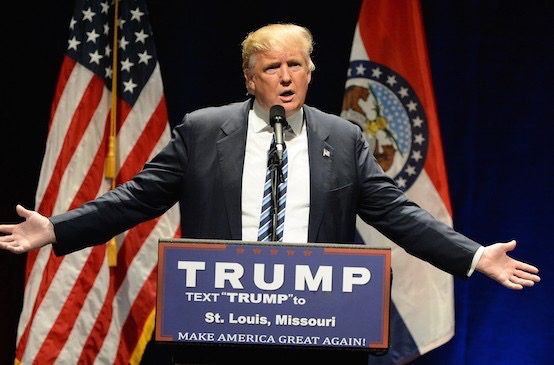Trump’s Weak Campaign Organization

Ross Douthat imagines a Trump victory scenario:
Now let me turn the screw a little further. The American Electoral College is an unusual system, and Trump is an unusual candidate. He’s likely to underperform among normal Republicans in many red states, where the white working class is already very Republican, by losing white suburban professionals who voted for John McCain and Mitt Romney. But he might overperform in Rust Belt states where the white working class is still a residually liberal swing vote, and where there are a lot of disaffected independents who sat out 2012. (That’s probably how you can have state polls showing strikingly close races in Republican strongholds like Georgia and Arizona, even though Trump is quite competitive in swing states like Ohio.)
This unusual combination — underperforming but still probably winning Republican states, possibly overperforming in purple states — suggests a true black swan endgame: Not Trump 44, Clinton 43, but Clinton 45, Trump 43 … except that Trump, with his Rust Belt strength, loses a lot of reliable deep-red votes he doesn’t need and turns out just enough nonvoters in a few key swing states [bold mine-DL] to take the Electoral College 270-268.
All of this sounds plausible enough, except for the part where the Trump campaign successfully gets his voters to turn out. Trump’s campaign organization has never been very good, and in the primaries it usually didn’t need to be. His campaign infrastructure for the general election is very weak, which suggests that there could be a lot of people saying that they’ll vote for Trump in poll responses that won’t show up. There is now an effort to improve the Trump campaign’s ground game, but they are off to a very late start. Florida is just one example of the complete mismatch between the Clinton and Trump campaigns:
By Labor Day, Clinton opened 51 field offices. Trump opened one.
Trump and Clinton are tied in Florida right now, so her advantage in organization may make all the difference. This isn’t just a Florida problem for him. Trump lags behind Clinton in campaign organization all over the country. Jim Geraghty noted earlier this month:
As of Aug. 30, Hillary Clinton has 291 offices in 15 battleground states. Donald Trump has 88.
For comparison, back in 2012, Obama’s campaign had 790 campaign offices across the country, and 433 were in five states: Ohio, Florida, Iowa, Wisconsin, and Colorado. Mitt Romney’s campaign had 284 campaign offices, with 139 in those five key states.
It is possible that the RNC will be able to fill in some of the gaps left by the Trump campaign, and it is trying to do that, but overall the Republican ground game is significantly weaker than it was four years ago. Campaign organization does matter and has an impact on the final outcome. The weakness of his campaign organization will probably cost Trump one to two points in several states that he can’t afford to lose. So it’s hard to see how Trump narrowly ekes out an Electoral College victory with better-than-expected results in the Midwest, especially when he is behind by several points in most of the Midwestern toss-up states.
In fact, the Electoral College math looks very daunting for Trump. The RCP electoral map assigns Trump/Pence 154 electoral votes right now, and assigns 209 to Clinton/Kaine. In order to reach 270, Trump has to sweep almost all of the states listed as toss-ups, while Clinton can get there with just a few of them. Let’s assume for the sake of this exercise that Trump wins all the toss-ups where is currently leading in the polling average by even the smallest margin: Florida, Iowa, Arizona, Georgia, Missouri, and Maine’s 2nd Congressional district. That gets him to 227. It’s hard to see where Trump gets the other 43 votes that he needs. Michigan, Wisconsin, and Pennsylvania haven’t voted for a Republican for president since the ’80s, and they don’t seem likely to do so now. Trump could conceivably win North Carolina and Ohio, but those two would’t get him there, and adding New Hampshire’s 4 votes wouldn’t be enough. The best-case scenario for Trump that I can see is that he wins 264 electoral votes, and I assume he isn’t going to get anywhere close to that.
Comments